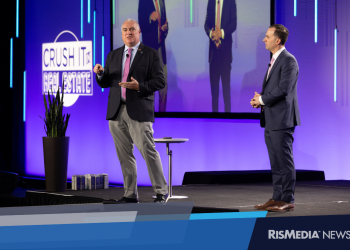RISMEDIA, March 12, 2008-(MCT)-Owing more on properties than they’re worth, some local homeowners are voluntarily walking away from their house notes.
“They don’t need to be foreclosed on. They’re just turning in the keys,” said Martha Lucey, president and chief executive officer of Fresno-based nonprofit credit counselors, By Design Financial Solutions. “The problem we’re seeing is that (these residents’) equity position is compromised. They’re upside-down.”
They are also willing to accept the disadvantages of foreclosure — the damage to their credit, their ability to re-enter the housing market and even their capacity to find a job in the future.
Among the signs of the growing interest and acceptance: Entrepreneurs launched a San Diego County business to show homeowners the steps to take. The state’s largest credit union has dedicated a small pool of money to give some a second chance at homeownership. Workshops are being offered across the region to educate consumers on all available options, including foreclosure.
Although homeowners often try to renegotiate the terms of their mortgages, lenders are often reluctant or unable to do so. One mortgage may be held by dozens of investors, and not all of those investors will accede to changes.
“We hadn’t had any foreclosures until 2007. Now, we’ve had a couple walkaways and others insinuating that they would,” said Paul Rigdon, vice president of lending at North Highlands-based SAFE Credit Union.
Walkaways could be a growing problem — or simply the latest media sensation, said Paul Leonard, California director of the Center for Responsible Lending. The cases, so far, are anecdotal.
Yet, said Leonard, “the notion is very unsettling that foreclosure is an option (for homeowners). The home is a palace of things for many. The vast majority of foreclosures are involuntary.”
In California, foreclosures are becoming record-setting reality: Lenders mailed homeowners nearly 82,000 default notices in the fourth quarter 2007, according to real estate tracker DataQuick Information Systems. That’s up 12% from the third quarter, nearly 115% from fourth quarter 2006, and the highest total since DataQuick began its tally 16 years ago.
In 2007, the Sacramento metropolitan area had the fifth-highest foreclosure rate in the nation with more than 49,500 filings, according to RealtyTrac.
Rigdon and other lenders are trying to persuade homeowners to weather the downturn.
“This is going to affect their credit for quite some time. Some people are just looking at their situation and are hoping that lenders will relieve them of their problem,” Rigdon said. “We don’t want to take their homes. With the market the way it is, foreclosures are in nobody’s best interest.”
Foreclosure stays on a consumer’s credit report for seven years after an initial payment is missed, said Rod Griffin, senior manager for public education at Dallas-based credit bureau Experian.
Credit scoring doesn’t assign point values to foreclosures or repossessions, but it does provide a lender with a window into a person’s credit life, Griffin said. Often, foreclosure is the culmination of a history of late payments in other areas.
Employers have begun scrutinizing such histories in evaluating the fitness of job candidates, especially those seeking to manage finances or handle sensitive information, Griffin said.
Nonetheless, home buyers are now using foreclosure as a financial planning tool. At youwalkaway.com, Jon Maddux and his staff in San Diego County lead homeowners through the steps on how to do it.
On a slow day, the site gets about 2,500 hits, said Maddux, who co-founded the company in January after a career in finance and real estate. As many as 20 clients a day follow through with the company, he added.
Because they are not real estate agents, You Walk Away also refers clients to agents for assistance and offers a “Walk Away Protection Plan and Kit.”
Many clients come from states ravaged by foreclosures — Arizona, Florida and Nevada, Michigan, Ohio and here in California. They are people who fell into the trap of home as short-term investment, only to be overwhelmed by adjustable mortgages with ballooning rates.
Still others were enticed by low-down-payment or zero-down mortgage deals and, today, have no equity to show for it.
Despite the firm’s name, Maddux insisted his staff tries to steer clients away from foreclosure.
“We can’t say we never tell them” to opt for it, Maddux said. “If there’s a teacher in a $700,000 home that’s taking up 100% of her income, no loan modification is going to help.”
In Sacramento, certified loss mitigator Linda Caoili counsels struggling homeowners facing foreclosure and offers seminars at local bookstores with titles such as “Foreclosure is Not a Dirty Word” and “Foreclosure is Not the End of the World.”
She said her sessions address the emotions attached to foreclosure as much as the options and the nuts and bolts.
“They rode the equity bubble, and now there’s anxiety, denial, frustration, guilt. It’s the other f-word, but I tell them it’s just a business transaction,” Caoili said. “I help people to say ‘foreclosure’ out loud.”
Caoili has seen both boom and bust in the real estate world. A top seller for Coldwell Banker during the market’s peak, she also lost a home to foreclosure 25 years ago after a divorce.
Caoili, now with Re/Max Gold, doesn’t encourage her clients to seek foreclosures. Rather she tells them of options from refinancing to short sales — where the lender allows the home to be sold for less than the amount owed on a mortgage.
Life does exist after foreclosure, though the credit crunch has led banks to tighten lending guidelines.
At Sacramento-based Golden 1 Credit Union, the nation’s sixth-largest such institution, Chief Executive Teresa Halleck is rolling out a $20 million program to help those who have lost their houses get into another one and rebuild their credit.
“They were victims,” said Halleck. “Those who fit the criteria — if they lost their homes in the last 18 months — we’d like them to apply for repair loans.”
The fixed-rate loans, dubbed mortgage repair loans, are available with a 30-year maximum term. Second mortgages aren’t allowed for two years to avoid amassing high debt loads. If accepted, the borrowers must also enroll in debt counseling.
“We’re hoping to get people back in houses,” Halleck said.
Copyright © 2008, The Sacramento Bee, Calif.
Distributed by McClatchy-Tribune Information Services.










